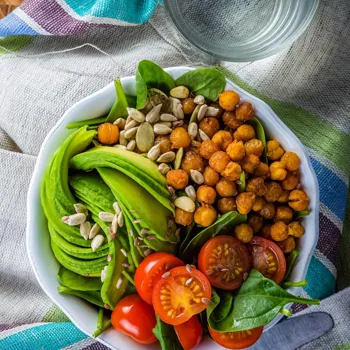Discover the 7 vital nutrients often missing in Indian diets. Learn to boost your health and energy levels. Read on!
In bustling India, where diverse culinary traditions meet fast-paced modern lives, maintaining
a balanced diet can be quite a challenge. While our plates are often brimming with flavorful dishes, crucial nutrients sometimes take a backseat.
This can lead to deficiencies that impact our energy levels, immunity, and overall well-being. Don't fret, though! Identifying these nutritional gaps is the first step towards a healthier you.
Let’s explore seven essential nutrients that are often overlooked in Indian diets and simple ways to incorporate them into your daily meals.
Vitamin D: The Sunshine Nutrient
Vitamin D, often dubbed the "sunshine vitamin," is critical for calcium absorption, bone health, and immune function. In a country blessed with abundant sunshine, it might seem counterintuitive that Vitamin D deficiency is widespread.

However, lifestyle factors like indoor jobs, pollution, and limited sun exposure contribute to this issue. Moreover, darker skin tones require more sunlight to produce the same amount of Vitamin D. Vitamin D strengthens bones and boosts immunity, making us less susceptible to illnesses.
Ensuring adequate Vitamin D levels is vital for overall health and preventing long-term complications.
Good sources: Fortified milk and cereals are enriched with adding nutrients it, that can boost daily vitamin D intake.
Mushrooms, particularly when exposed to UV light, offer a plant-based source of vitamin D. Sunlight is ideal source for vitamin D.
Vitamin B12: The Energy Booster
Vitamin B12 is essential for nerve function, DNA synthesis, and red blood cell formation. It plays a vital role in energy production, preventing fatigue and weakness. This nutrient is primarily found in fruits and dairy products, making vegetarians and vegans particularly susceptible to deficiency.
Symptoms of Vitamin B12 deficiency include fatigue, weakness, numbness, and even neurological problems. Ensuring adequate Vitamin B12 levels is crucial for maintaining energy levels and preventing long-term complications.
Good sources: Fortified foods are useful, as are grains.
Nutritional yeast is another option, rich in both B vitamins and protein. Fortification can help in your daily diet.
Iron: The Blood Builder
Iron is a key component of hemoglobin, the protein in red blood cells that carries oxygen throughout the body. Iron deficiency is a common problem in India, particularly among women and children, leading to anemia.

Symptoms of iron deficiency include fatigue, weakness, shortness of breath, and paleness. Iron is vital for maintaining energy levels and preventing anemia and its associated complications. Increasing iron intake can significantly improve overall health.
Good sources: Spinach, lentils, chickpeas, dried fruits like raisins and apricots for a good iron source. Consuming these foods with vitamin C helps in absorption.
Calcium: The Bone Strengthener
Calcium is critical for maintaining strong bones and teeth and also plays a role in muscle function, nerve transmission, and blood clotting. Dairy products are rich in calcium, they do not suit everyone, alternatives are essential.

A diet lacking in calcium can lead to osteoporosis and an increased risk of fractures. Calcium is not just for bones and teeth, also for muscles, nerves, and blood. Ensuring adequate calcium intake is essential for maintaining both skeletal and overall body health.
Good sources: Leafy green vegetables are excellent sources of calcium. Fortified plant-based milks offer a dairy-free alternative. Seeds like chia and sesame seeds can also contribute to your daily calcium intake.
Iodine: The Thyroid Supporter
Iodine is essential for thyroid hormone production, which regulates metabolism, growth, and development. Iodine deficiency can lead to thyroid disorders, including goiter and hypothyroidism. Using fortified salt helps ensure better health.
Thyroid hormones regulate metabolism, hence iodine is very critical. Adequate iodine is essential for overall body functioning and health.
Good sources: Use fortified salt in your cooking and at the table to ensure adequate iodine.
Seaweed is a naturally rich source of iodine, but, consume in moderation.
Fiber: The Gut Friend
Fiber is essential for digestive health, regulating blood sugar levels, and promoting satiety. Most Indian diets, while rich in carbohydrates, lack sufficient fiber. A low-fiber diet can lead to constipation, increased risk of heart disease, and type 2 diabetes.
Including fiber-rich foods in daily diet, can help in digestive health and also promote over all health.
Good sources: Fruits and vegetables are a great source of fiber. Legumes are excellent source of fiber. Whole grains should be part of daily consumption.
Omega-3 Fatty Acids: The Brain Booster
Omega-3 fatty acids are important for brain health, heart health, and reducing inflammation. Primarily found in fruit and dairy items. A diet lacking in omega-3 fatty acids can contribute to cognitive decline, heart problems, and inflammatory conditions.
Omega-3 fatty acids are important for overall well-being and are essential in diet.
Good sources: Flaxseeds, chia seeds are rich in omega-3 fatty acids. Walnuts are a plant-based source of omega-3s.
By consciously including these seven essential nutrients in our daily meals, we can bridge the nutritional gaps in our diets and pave the way for a healthier and more energetic life. Consult a doctor.













